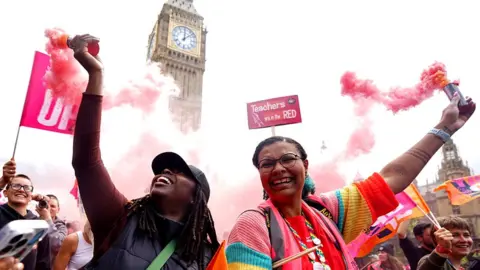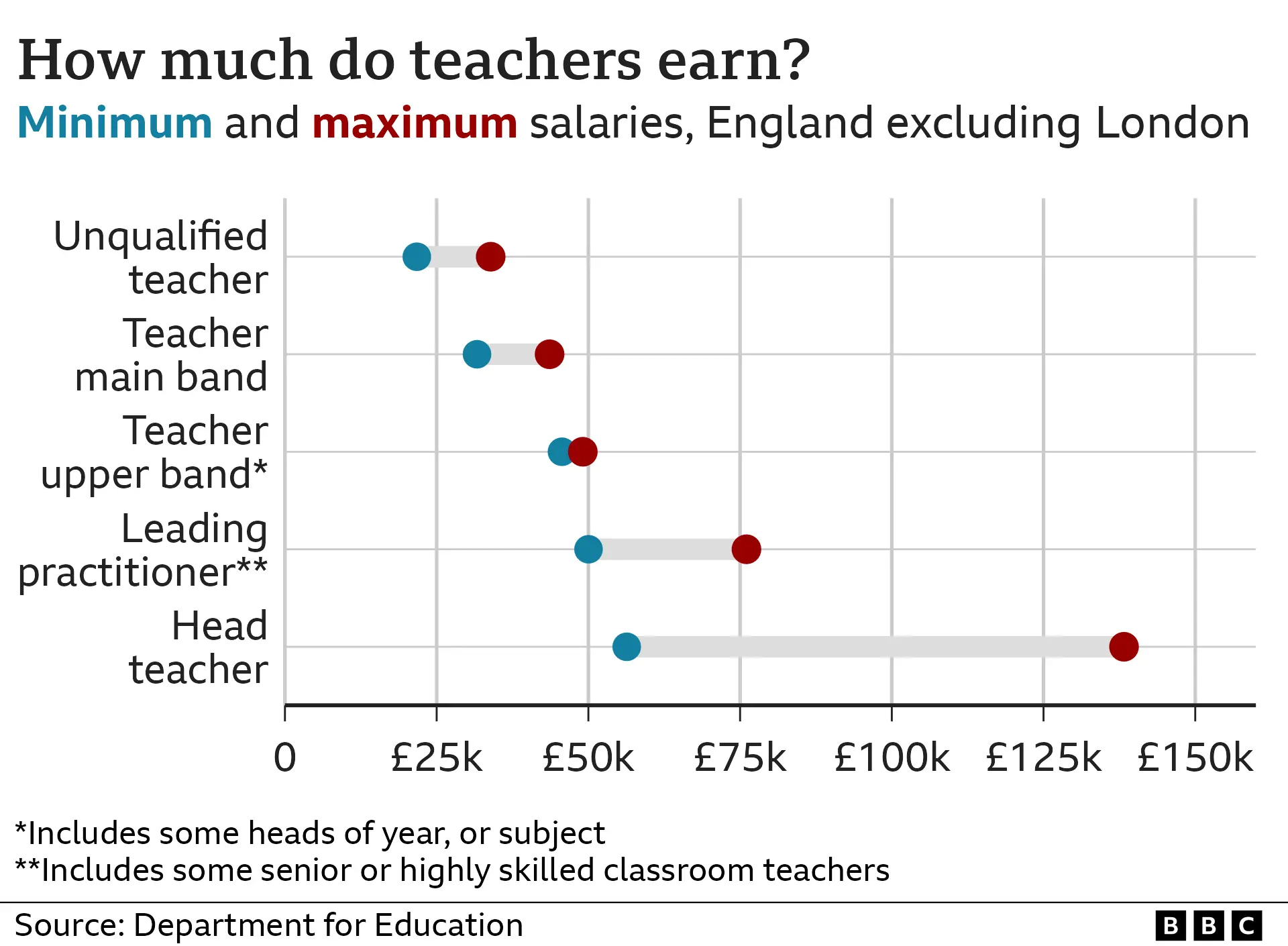Teachers' strikes: Will there be more?
 PA Media
PA MediaMembers of the National Education Union (NEU), England's largest teaching union, will vote on taking strike action if the government sticks with its 2.8% pay offer for the 2025-26 academic year.
They agreed to launch a formal ballot if the pay offer "remains unacceptable or if the government does not announce real terms funding increases".
Are more strikes planned?
The NEU announcement does not mean teachers in England are about to walk out.
The union will need to reject a final decision from the government on teacher pay - including both the size of the pay rise, and whether or not there will be any additional funding for it.
If it does launch a formal ballot, enough members would need to vote and support strike action. That ballot could open for several months, meaning any strike action would likely take place in the autumn term at the earliest.
Last week, results from an informal ballot showed 93.7% of members rejected the offer and 83.4% said they would be willing to strike. The turnout was 47.2%.
NEU members went on strike over pay in the first half of 2023, forcing many schools to close on eight days of action. The NEU called off action after the government revised its 2023 offer to 6.5%.
Teachers were then given a 5.5% rise in 2024.
In December, the government recommended a 2.8% pay rise for 2025.
What do teachers want?
England
In a letter to Education Bridget Phillipson after the government's recommendation of a 2.8% pay rise, teaching unions said they had been clear that the 5.5% increase in 2024 "must be only the first in a series of fully funded, above inflation pay increases needed to correct teacher and school leader pay".
They said that the value of teacher pay had fallen since 2010, which, coupled with "excessive workload", had contributed to a "crisis" in recruitment and retention.
They also want the government to fund the pay rise so that schools do not have to pay for it through existing budgets. At present, the government expects that most schools will have to make "efficiencies" in order to afford the additional cost.
Each year, the independent School Teachers Review Body (STRB) hears submissions from each side and makes recommendations on teacher pay to the government, who ultimately decide on how much to award.
Wales
The Welsh Government made a pay offer for 2024/25 in line with England's 5.5% teacher pay rise, which was higher than the 4.3% recommended by the Independent Welsh Pay Review Body (IWPRB).
Long-running action ended in November 2023 after NAHT members accepted a new workload agreement along with an improved pay offer and additional funding.
Scotland
In September 2024, Scottish teaching unions unanimously accepted a pay offer of 4.27% for the current academic year.
Northern Ireland
A potential strike by Northern Ireland's teachers was averted this month.
In February, teachers rejected an offer of 5.5% and started action short of strike in schools.
But unions have now accepted a revised deal. The pay rise will remain at 5.5%, but the agreement also contained commitments to address concerns about workloads.
Will my child's school close if strikes happen?
Although none are currently planned, schools in England should open where possible in the event of a teachers' strike, the government says.
Teachers do not have to declare in advance if they intend to strike, and there are no rules about when parents must be told about school closures.
Head teachers take a decision on whether to shut schools. Some parents may only be told about a closure on the morning of industrial action, once staff numbers are known.
The new Labour government repealed the previous government's minimum service level law, which unions had called "undemocratic".
Can parents take time off, and what else do you need to know?
In England, you can ask for leave to care for "family and dependants", including emergency childcare.
Your employer must not refuse a reasonable request, but you may not be paid. Alternatively you may be able to take holiday or unpaid parental leave.
Schools are asked to prioritise vulnerable pupils and key workers' children during strikes. They are also asked to try to prevent, or reduce, any disruption to exams and other formal assessments.
The NEU issued guidance to support arrangements for head teachers to "provide the minimum level of teaching staff needed" on strike days so students who had exams coming up could attend school.
Schools must also support children eligible for benefits-related free school meals if they close.
How much are teachers paid?
Classroom teachers were paid an average of £43,100 in the 2023/24 school year in England and £47,340 in Wales. In Scotland teacher pay is higher, where fully qualified teachers who have passed their probation start on £40,305.
The average head teacher salary in England for the same period was £75,300, and £60,500 for other senior leaders.

Experts advise ministers about teacher pay, based on factors such as vacancy rates and subject shortages.
As with all public spending, money allocated in England is awarded proportionately to Scotland, Wales and Northern Ireland.
Employers also contribute 28.6% to teacher pensions. Nurses, by comparison, receive 23.7%, which includes 14.38% from employers and 9.4% made centrally from NHS England.
